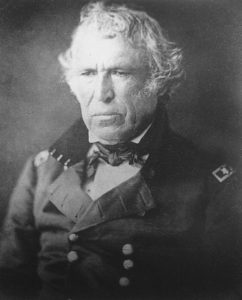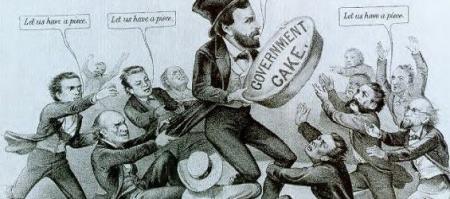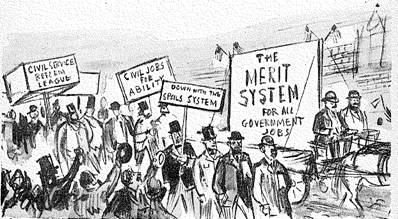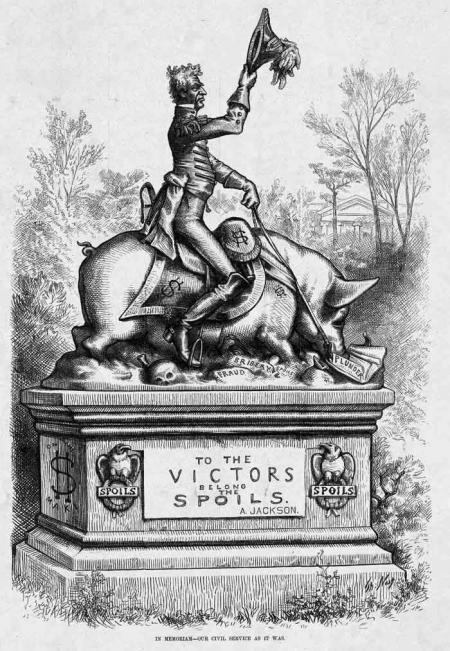How an Outsider President Killed a Party
The Whigs chose power over principles when they nominated Zachary Taylor in 1848. The party never recovered.
By Gil Troy – June 02, 2016
It was summer, and a major U.S. political party had just chosen an inexperienced, unqualified, loutish, wealthy outsider with ambiguous party loyalties to be its presidential nominee. Some party luminaries thought he would help them win the general election. But many of the faithful were furious and mystified: How could their party compromise its ideals to such a degree?
Sound like 2016? This happened a century and a half ago.
Many have called Donald Trump’s unexpected takeover of a major political party unprecedented; but it’s not. A similar scenario unfolded in 1848, when General Zachary Taylor, a roughhewn career soldier who had never even voted in a presidential election, conquered the Whig Party.
A look back at what happened that year is eye-opening—and offers warnings for those on both sides of the aisle. Democrats quick to dismiss Trump should beware: Taylor parlayed his outsider appeal to defeat Lewis Cass, an experienced former Cabinet secretary and senator. But Republicans should beware, too: Taylor is often ranked as one of the worst presidents in U.S. history—and, more seriously, the Whig Party never recovered from his victory. In fact, just a few years after Taylor was elected under the Whig banner, the party dissolved—undermined by the divisions that caused Taylor’s nomination in the first place, and also by the loss of faith that followed it.
***
Born in 1784 into a prominent Southern slaveholding family, Taylor was commissioned as an army officer at age 23. He first distinguished himself as a captain in the War of 1812 and gained even greater fame in the Second Seminole War, for which he earned the nickname “Old Rough and Ready” by bravely crossing a treacherous swamp with his men during the Battle of Okeechobee. The moniker suited this stocky, stern, undisciplined slob, who shared his men’s battlefield hardships and rarely dressed in military finery. With his signature straw hat, “he looks more like an old farmer going to market with eggs to sell,” one officer muttered.
It wasn’t until the Mexican-American War that Taylor, by then a major general, became a beloved national hero. Just days before Congress officially declared war on Mexico in May 1846, Taylor led U.S. troops to two victories over much larger Mexican forces at Palo Alto and Resaca de la Palma. And in February 1847, Taylor’s force defeated Mexican troops despite being outnumbered 3 or 4 to 1 at the Battle of Buena Vista. After the victory, Taylor was toasted from Maine to Georgia. Americans sang, “Zachary Taylor was a brave old feller, Brigadier General, A, Number One/ He fought twenty thousand Mexicanoes;/ Four thousand he killed, the rest they ‘cut and run.’”
Members of both major political parties at the time—the Democrats and the Whigs—started holding public celebrations lauding Taylor with elaborate toasts to George Washington, the republic and their new hero. They often culminated with formal resolutions amid loud “huzzahs” endorsing Taylor’s nomination for president in 1848. As the booze-fueled, red, white and blue political excitement grew, one Kentuckian exclaimed, shortly after Taylor’s Buena Vista victory, “I tell ye, General Taylor is going to be elected by spontaneous combustion.”
As an active soldier, Taylor demurred at first. All his life, Taylor had proudly refused to enroll in a political party, boasting that he never voted. As late as 1846, Taylor insisted the idea of becoming president “never entered my head … nor is it likely to enter the head of any sane person.” His wife was ill and he felt unqualified. And he preferred to tend to his vast landholdings and slaveholdings in Kentucky, Louisiana and Mississippi—an inherited fortune augmented thanks to goodies showered on him after his war victories that made him one of the wealthiest Americans of his day.
Eventually, however, the political fervor swept up Taylor, too. In various letters that were quickly (and intentionally) publicized by the recipients, Taylor began explaining how “a sense of duty to the country” forced him to overcome his “repugnance” and permit people to advance his name. He might defer to the “spontaneous move of the people” but “without pledges” to stay true to any specific platform plank. He would only accept a nomination to be “president of the nation and not of a party.” A genuine nationalist who recognized how much Americans disliked professional politicians, Taylor placed himself above the “trading politicians … on both sides.”
Despite all this talk of staying away from one party or another, Taylor began inching toward the Whig Party, and the Whigs inched closer to him. At first glance, a general seemed to be a strange choice for the Whigs. Founded in the 1830s as a strained coalition of Southern states’ rights conservatives and Northern industrialists united mostly by disgust at Andrew Jackson’s expansion of presidential power, the Whig Party considered the war a disastrous result of presidential overreach. In fact, the popular backlash they stirred against Democratic President James K. Polk was so great that the Whigs seized control of Congress during the 1846 midterm election. But once America’s victory over Mexico triggered such enthusiasm, some Whigs calculated that running an extremely popular war hero like Taylor would prove to voters that the Whigs were patriotic, despite their anti-war stance.
Taylor also appealed to the Whigs’ founding fear of presidential power. In the letters he wrote, he invoked Whig doctrine, justifying a passive president who deferred to the people and the Congress.
And then, there was the slavery issue: Taylor’s ambiguous status as a slaveholder who dodged questions about the escalating slavery debate seemed to be a clever choice for a party increasingly divided over the South’s mass enslavement of blacks. The territory the U.S. acquired during the Mexican-American War only escalated the feud, sparking a major political debate over whether slavery would be allowed in the new territories. Both parties (each awkwardly uniting Northerners who disliked slavery with Southern slaveholders) had reason to seek safe candidates that year.
Still, many Whig loyalists mistrusted Taylor. He was crude, nonpartisan, unpresidential. Ohio Senator Thomas Corwin wondered how “sleeping 40 years in the woods and cultivating moss on the calves of his legs” qualified Taylor for the presidency. The great senator and former Secretary of State Daniel Webster called Taylor “an illiterate frontier colonel who hasn’t voted for 40 years.” Webster was so contemptuous he refused backroom deals to become Taylor’s running mate (unknowingly missing a chance to become president when Taylor died during his first term). Indeed, the biographer Holman Hamilton would pronounce Taylor “one of the strangest presidential candidates in all our annals … the first serious White House contender in history without the slightest experience in any sort of civil government.”
By the spring of 1848, now hungering for the nomination, Taylor tried mollifying these partisans. He professed his party loyalty in a ghostwritten letter that his brother-in-law John Allison knew to leak to the public. Still wary of making “pledges,” and boasting of his ignorance of political “details,” Taylor declared, “I am a Whig, but not an ultra Whig” in his first “Allison Letter” of April 22, 1848.
Taylor’s dithering annoyed the legendary ultra-Whig Henry Clay, who had lost a heartbreaking contest in 1844 to Polk and expected the 1848 nomination. “I wish I could slay a Mexican,” Clay grumbled, mocking celebrity soldiers not Hispanics. “The Whig party has been overthrown by a mere personal party,” he complained in June, vowing not to campaign if the party nominated this outsider. “Can I say that in [Taylor’s] hands Whig measures will be safe and secure, when he refused to pledge himself to their support?”
With Polk respecting his promise to serve only one term, at their convention in May the divided Democrats settled on General Lewis Cass, a former congressman, secretary of war and senator. The lumbering Michigander was considered a “doughface,” too malleable, a Northern man with Southern principles. His support for “popular sovereignty,” letting each new territory decide for itself on whether it would permit slavery, pleased the Democratic Party’s pro-slavery majority but infuriated abolitionists.
That June, during their convention at the Chinese Museum Building in Philadelphia the Whigs were torn over Taylor. On the first ballot, Taylor won 76 percent of the Southern vote, but 85 percent of the Northern delegates opposed him. A rival Mexican War hero, the Virginia-born General Winfield Scott, appealed to antislavery Whigs who hated Clay and Taylor because they were both slaveholders. On the fourth ballot, Taylor secured the nomination, beating Clay, Scott and Webster.
Taylor claimed he won on his own nonpartisan terms, without any promises. This victory signaled “confidence in my honesty, truthfulness and integrity never surpassed and rarely equaled [since George Washington],” Taylor boasted, 98 years before the originator of Trump-speak was born.
But the sectional animosity this outsider stirred was discouraging, especially since he was supposed to be capable of uniting the party and the nation. In the end, 62 percent of Taylor’s votes still came from Southern Whigs, who calculated that Taylor’s nomination would kill the abolitionist movement: “The political advantages which have been secured by Taylor’s nomination, are impossible to overestimate,” cheered one Southerner.
The nomination left many other Whigs dissatisfied. Even though the convention nominated the loyalist Millard Fillmore as vice president, many lamented that Taylor’s popularity had trumped party loyalty and principles. The party had not even drafted a platform for this undefined, unqualified leader. Horace Greeley of the New York Tribune pronounced the convention “a slaughterhouse of Whig principles.” The Jonesborough Whig did not know “which most to dispise, thevanity and insolence of Gen. Taylor, or the creeping servility” of the Whig Convention that nominated him.
Resisting pressure to run as an independent, but refusing to stump for Taylor, Henry Clay exclaimed, “I fear that the Whig party is dissolved and that no longer are there Whig principles to excite zeal and simulate exertion.” A New York Whig, claiming the convention “committed the double crime of suicide and paricide,” mourned, “The Whig party as such is dead. The very name will be abandoned, should Taylor be elected, for ‘the Taylor party.’”
And the party did indeed begin to dissolve. Almost immediately after the nomination, the self-proclaimed “Conscience Whigs” (anti-slavery Whigs) bolted, refusing to support a slaveholding candidate. Joining various other anti-slavery factions, including those that defected from the Democratic Party, the rebels formed The Free Soil Party and nominated former President Martin Van Buren.
Heading into the general election campaign, things didn’t look so good for Taylor. He started writing more and more letters crowing about his independence, disdaining party discipline, even saying he would have accepted the Democratic Party’s nomination too in his quest to be “president of the whole people.” His vanity and recklessness further dampened Whig enthusiasm.
But Fillmore’s desperate pleas to mollify alienated Whigs compelled Taylor to release a “Second Allison Letter” on September 4. In this missive, Taylor insisted he was following “good Whig doctrine” by saying “I would not be a partisan president and hence should not be a party candidate.” Taylor again hid behind his Army service, saying a soldier had to be nonpartisan, but also insisting everyone knew of his Whig inclinations. The letter “is precisely what we wanted,” Fillmore rejoiced. More important than Taylor’s words, the timing gave some Whigs an excuse to declare themselves satisfied. Even the New York Tribune’s Greeley eventually endorsed Taylor.
Meanwhile, in critical states like Ohio, Whig bosses and officeholders stressed “state matters” to stir local loyalties. And when it came to the divisive slavery issue, what the Democrats called the Whigs’ “two-faced” campaign worked: The Whigs in the South insisted that no slaveholder would abandon slavery, as Northern Whigs whispered that the passive Taylor would never veto a bill banning slavery in the new territories if it passed.
Blessed by an even more unpopular Democratic opponent whose party suffered more from the antislavery defections than the Whigs did, Taylor won—barely. He attracted only 47 percent of the popular vote, merely 60,000 more popular votes than Clay had in 1844, despite a population increase of 2 million. Turnout dropped from 78.9 percent in 1844 to 72.7 percent in 1848, reflecting public disgust with both candidates. Cass won 43 percent of the vote, and Van Buren won 10 percent. Taylor’s Electoral College margin of 36 was the slimmest in more than two decades. As hacks said the results “vindicated the wisdom of General Taylor’s nomination,” purists mourned the triumph of Taylor but not “our principles.” Greeley said losing in 1844 with a statesman like Clay strengthened Whig convictions: The 1848 election “demoralized” Whigs and undermined “the masses’” faith in the party. Greeley mourned this Pyrrhic victory: Whigs were “at once triumphant and undone.”
Greeley turned out to be right. Taylor was the last Whig president. His nomination had attempted to paper over the sectional tensions that would kill the party, but ultimately exacerbated them. Running a war hero mocked the Whig’s anti-war stand just as running a slaveholder failed to calm the divisive slavery issue. And, as a nonpartisan outsider, Taylor proved particularly unsuited to manage these internal party battles once elected.
Most dispiriting, Taylor, who made no pledges and had no principles, gave rank-and-file Whig voters nothing to champion, while alienating many of the most committed loyalists. In The Rise and Fall of the American Whig Party, the historian Michael Holt notes that Taylor’s victory triggered an “internal struggle for the soul of the Whig party”: was it more committed to seizing power or upholding principle? Underlying that debate was also a deeper question, still pressing today, about the role of fame, popularity, celebrity, in presidential campaigning—and American political leadership.
Unfortunately for the wobbling Whigs, Southerners then felt betrayed when Taylor took a nationalist approach brokering what became the Compromise of 1850. As a result, Holt writes, “Within a year of Taylor’s victory, hopes raised by Whigs’ performance in 1848 would be dashed. Within four years, they would be routed by” the Democrats. “Within eight, the Whig party would totally disappear as a functioning political organization.”
Neither destiny nor sorcery, history offers warning signs to avoid and points of light for inspiration. America’s modern two-party system is remarkably resilient. Republicans have recently enjoyed a surge in gubernatorial, congressional and state legislative wins. Still, Trump and the Republicans might want to study 1848 to see the damage even a winning insurgent can both signal and cause. And many Republicans might want to consider what is worse: the institutional problems mass defections by “Conscience Republicans” could bring about—or the moral ruin that could come from the ones who stay behind, choosing to pursue party power over principles.
Gil Troy is Professor of History at McGill University and the author of eleven books, including, most recently, The Age of Clinton: America in the 1990s. Earlier books include See How They Ran: The Changing Role of Presidential Candidates and the updated classic, History of American Presidential Elections. Follow Gil on Twitter @GilTroy.
In: politico.com
Ver:




